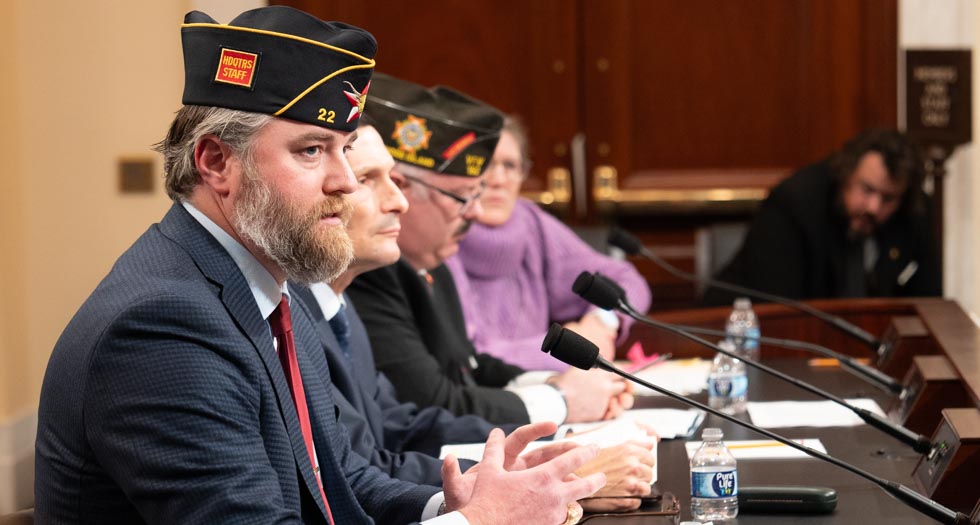
VA&R Director Cole Lyle shares support for What Works for Preventing Veteran Suicide Act and other legislation during House VA Committee hearing.
The U.S. Department of Veterans Affairs’ Staff Sergeant Parker Gordon Fox Suicide Prevention Grant program enables VA to provide resources toward community-based suicide prevention efforts to meet the needs of veterans and their families through outreach, suicide prevention services, and connection to VA and community resources.
But there need to be tangible standards for what is working within the Fox program. That’s what Cole Lyle, The American Legion’s Veterans Affairs & Rehabilitation director, shared during Dec. 17 testimony in front of the House Committee on Veterans’ Affairs Subcommittee on Health.
Lyle said the Legion supports H.R. 9924, the What Works for Preventing Veteran Suicide Act, which would require the VA secretary to establish clear and measurable objectives for a suicide prevention pilot and grant programs carried out through the Veterans Health Administration (VHA).
“Fox grants have allowed organizations to coordinate initiatives related to post-traumatic growth, peer-support services and cultural/faith-based programs,” Lyle said. “This upstream approach aligns with The American Legion’s Be the One campaign and Buddy Check program, and we strongly support any effort by this committee to address the veteran suicide epidemic. But we also recognize Congress’ duty to ensure taxpayer dollars are going to effective programs and organizations.
“The American Legion supports H.R. 9924, which would establish standards for clear and measurable objectives to help evaluate the effectiveness of programs like Fox, and the creation of a standardized methodology for future initiatives.”
Lyle, who uses VA for his healthcare, also spoke about the Choice and MISSION Act. He said as a VA patient, he understands both the successes and the frustration veterans feel when they attempt to obtain an appointment, navigate community care and feeling empowered to make their own decisions.
“Congressional intent of the Choice and MISSION Act was to strengthen the VHA’s direct care system whilst supplementing it with the important relief valve of community providers,” he said. “However, despite large increases in VA full-time employees, the inability of VA to meet access standards and the disregard for the (Asset and Infrastructure Review) Commission has led to a skyrocketing community care budget, which has naturally resulted in debates on balancing funding with the VA’s direct care system and adherence to eligibility requirements, which largely encompass the reason we’re here today.
“Congress must address the infrastructure problem in the 119th Congress and ensure the VA direct-care system is strengthened as was also the intent of MISSION. But in the absence of current VA capacity, we must keep the individual veteran as our North Star. In the past few years there have been credible reports of VA administrators overruling decisions by providers and patients to keep veterans in the system, in some cases cutting off care entirely. I’ve personally dealt with trying to use the DC VA and been quoted a long wait time, only to get a faster appointment after I asked to be given the option to use community care.”
Lyle said the Legion is a strong supporter of keeping VHA as the coordinator of care for veterans, which is why the organization opposes H.R.s 214, 3176 and 5287 as presently drafted. Lyle said all three would take a veterans VA provider and the veteran out of the equation entirely.
“However, if the VA cannot provide veterans with the care they need, when they need it, community providers are the only realistic solution in the best interest of the individual veteran,” Lyle said. “This is why we support the Complete the Mission Act of 2024, which amongst other important changes to scheduling, would codify access standards and ensure veterans get the care they need in consultation with their VA provider. Together, they can assess what is in the best medical interest of the veteran and maintain autonomy in their own healthcare.”
Lyle also spoke on both H.R. 6333, which mandates VA pay for all emergency care expenses – not just for those veterans without insurance – and H.R. 8481, which changes the requirement that veterans notify VA within 72 hours from the start of care to 72 hours from discharge.
“It is entirely possible that a veteran could be denied a claim because they were in a coma after a car accident and weren’t able to reach the VA within the required timeframe,” Lyle said. “Both bills help ensure a veteran’s financial and mental health are not affected by the unintended consequences of bureaucratic requirements.”
Addressing H.R. 8347, which directs VA to conduct a study on menopause care furnished by the VA Lyle added, “Women veterans are the largest growing demographic group of veterans, and they often face unique challenges that necessitate gender-specific care. The American Legion has authored numerous articles about the factors that impact women's health, including menopause, and it remains a priority for us. We support this bill as currently drafted.”
Read Lyle’s submitted testimony here.
- Legislative

